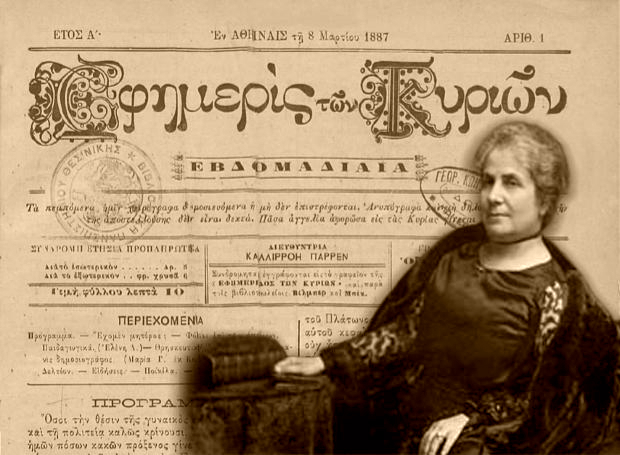
Stories Talk | Presentation Skills and Effective Storytelling
Stories Talk | Presentation Skills and Effective Storytelling
#feminism #journalism #womenmovement
By Mia Kollia
Translated by Alexandros Theodoropoulos
She was born in Platania Amariou in Rethymno, Crete, in 1861 and six years later she settled in Athens, where her father Stylianos Siganos was chairman of the Committee of Cretan Refugees. After spending her school years at the Sourmelis School in Piraeus and then at the French School of Nuns, she finally graduated with honours from Arsakeio in 1878.
After graduating, she went to Odessa, where for two years she was the headmaster of the girls' school of the Greek community. Returning to Athens, she married Ioannis Parren, a French-English journalist from Istanbul who was the founder of the Athenian News Agency.
Having secured the support of her husband, Kalliroi Parren decided to pursue the profession of journalism and indeed, on March 8, 1887, she published the weekly newspaper "Efimeris ton Kyrion" (Ladies’ Newspaper) which was the first women's newspaper in Greece. The first issue was distributed in 3,000 copies, which were immediately sold out, and reprinted in 7,000 more that were sold on the same day, at a time when Athens’ population was just 65,000 people, many of whom were illiterate.
The newspaper was written exclusively by women and was really successful inside and outside Greece, reaching 5,000 copies in 1892, while it pioneered movements in favor of women, culminating in the submission of a petition of 2,850 signatures to the government of Charilaos Trikoupis in favor of women's education.
The circulation of the newspaper continued for 31 years, until its abrupt cessation in November 1917, due to the political upheavals in the country. Kalliroi Parren herself was then exiled to Hydra due to her political beliefs, until November 1918.

The great activist of the women's movement left behind as a legacy a rich literary work, which mainly concerned feminism, but her action was not limited there. She actively participated in international women's conferences around the world in order to spread the need to provide education and work for women.
She also founded the "Sunday School of Poor Women and Girls" (1890), the "Asylum of St. Catherine" (1895), the "Asylum of the Infirm" (1896), the "Patriotic Association" and the "Union in favor of Women's Emancipation", while after a conference in Paris in 1896, the "Union of Greek Women" was established under Parren's presidency.
Also, her passion for the preservation of Greek customs and traditions, led her to create the "Lyceum of Greek Women" in 1911, which began during the Balkan Wars, to record, teach and present traditional Greek dances , while the school’s work and actions are known to this day, having many members in Greece and abroad.
Another very important contribution of Kalliroi Parren was that after her hard efforts, the government of Theodoros Diligiannis allowed women to study at the university and the technical university, at a time that this was established across Europe.
She was also the first to raise the issue of women's suffrage movement in the 1890s, but no government accepted it until it took place after 70 years. Greek women that were over 30 years old and literate, gained the right to "vote and be elected" in the municipal elections of 1949. In 1952, the decision included the parliamentary elections too.
Kalliroi Parren died on January 15, 1940, after a stroke. She was the first Greek woman to be buried at public expense, in recognition of her contribution to the Greek nation. Wanting to pay tribute to her memory, the Municipality of Athens placed a bust of her in the First Cemetery of Athens in 1992.
#feature